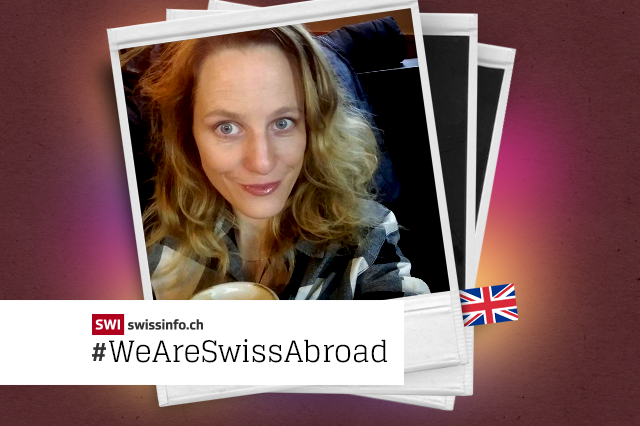‘Science is the brain, but photography is the heart’
Nature photographer Daisy Gilardini, originally from Ticino, now lives in Canada, where this year she was appointed “photographer-in-residence” for the magazine Canadian Geographic.
The 50-year-old works especially with animals from polar regions.
swissinfo.ch: When and why did you leave Switzerland?
Daisy Gilardini: I left Switzerland in 2012 for… love. I married David McEown, a Canadian watercolour artist, and moved to Canada.
swissinfo.ch: Was it a one-way trip, or are you planning to return to Switzerland some day?
D.G.: I love Switzerland and, in my heart, I will always consider it home. However, Canada is also a great place to live, especially for my job. I doubt that I’ll return for good, but I never miss my yearly visit.
The points of view stated in this article, especially about the host country and its politics, are the interviewee’s points of view and are not necessarily in line with swissinfo.ch’s position.
swissinfo.ch: How did you get into your line of work?
D.G.: As a child I’d grown up with the idea of becoming a veterinarian. I always loved nature and animals. But, often, life doesn’t play out how you plan it and I ended up becoming a certified expert in finance and accounting in Switzerland. After earning my master’s degree, I opened my own accounting firm.
For a time, with a good business plan and organizational skills, I managed to juggle my love for travel, nature and photography with day-job commitments. I started going on self-assignments for several months each year and I hired an assistant to help with the accounting business.

More
What the Swiss abroad think about Switzerland
Every time I returned to the office, though, I felt a little depressed and unfulfilled. I started writing articles and sought out magazines interested in publishing my work. It was like having two full-time jobs. My day would start at 7am and finish at midnight, seven days a week.
They say the key to success is to believe in one’s ability. Patience, passion, and perseverance eventually lead to success, and at the end I finally succeed in having my work published. In 2006, I became a full-time photographer.
swissinfo.ch: What fascinates you most about animals from the polar regions?
D.G.: My love for wildlife started long ago. I was four years old when I received a little stuffed seal puppy toy as a gift from my godparents. My mom explained that the seal puppy came from a very cold place, that it lived on and under the polar ice. I was mesmerized by those stories. From that moment, I dreamed about one day seeing them in their natural environment.
It took me seven years to save the money to visit to Antarctica, but that trip totally changed my life! That was in 1997. Since then, I have joined almost 70 expeditions to the polar regions.
I’ve often tried to understand this irresistible attraction I have to the poles. I would define it almost as an addiction, or an obsession. The isolation from modern civilization and all its distractions makes me focus and appreciate the simple rhythms of nature.
swissinfo.ch: Is nature and the environment something you feel strongly about?
D.G.: The feeling of rediscovering the primordial connection with nature and the interdependence of species on earth inspires in me a deep respect and an awareness of the importance of these delicate ecosystems.
If humankind wants to survive and evolve with our planet, we need to act responsibly. We need to realize, with humility, that nature is not dependent on us but that we are dependent on nature.
And as conservation photographers, we have a duty to capture the beauty of places and species at risk and raise awareness through the universal power of images.
While science provides the data necessary to explain issues and propose solutions, photography symbolizes these issues. Science is the brain, while photography is the heart. We need both to reach people’s hearts and minds to move them to action. For nature, and for us.
swissinfo.ch: Where exactly do you live now? What’s your life and the food like?
D.G.: I currently live in VancouverExternal link. We have a little apartment in a building attached to the Pacific Spirit Regional Park, an 874-hectare park located in the University Endowment Lands.
During my breaks I never miss the opportunity to take a walk in the forest or at the beach, which is just a five-minute-drive from our place.
Vancouver is a very international city with an important Asian influence. You can find any kind of food here. Though one of the very few things I really miss from Switzerland and can’t find anywhere is real ‘Bündnerfleisch’.
swissinfo.ch: What do you prefer about Canada to Switzerland?
D.G.: Over the past 10 years I have travelled extensively through bear country, from the Great Bear Rainforest here in British Columbia to Alaska and the high Arctic.
Somehow the Canadian landscapes and mountains are similar to Switzerland, but on a much larger scale and they are teeming with wildlife.
swissinfo.ch: What’s your impression of Switzerland from abroad?
D.G.: I see Switzerland as a safe and politically very stable country compared to here in North America.
swissinfo.ch: Do you sometimes feel like a stranger, or are you well-integrated?
D.G. Photography takes me around the world from six to nine months a year. Integration is a difficult task when you’re on the road so long.
I feel like home for me is wherever I am with the people I love. When I work on ships in Antarctica I feel at home. When I am in Vancouver with my husband I feel at home. When I am in Switzerland with my friends I feel at home.
swissinfo.ch: Which cultural differences are hardest for you?
D.G.: I don’t find any particularly difficult cultural differences.
swissinfo.ch: What’s the best part of your day-to-day life abroad?
D.G.: Being able to be in the wilderness in just a few hours.
swissinfo.ch: Do you participate in Swiss elections and votes? Via postal voting or e-voting?
D.G.: I vote via correspondence.
swissinfo.ch: What do you miss about Switzerland?
D.G.: My friends. I don’t spend enough time in Vancouver to be able to build new friendships. That is probably the hardest part of living abroad but it is also due to my job.
swissinfo.ch: What do you miss about Switzerland?
D.G.: My friends. I don’t spend enough time in Vancouver to be able to build new friendships. That is probably the hardest part of living abroad but it is also due to my job.
Are you a Swiss citizen living abroad? If so, add the hashtag #WeAreSwissAbroadexternal linkExternal link to your photos on Instagram.

In compliance with the JTI standards
More: SWI swissinfo.ch certified by the Journalism Trust Initiative
















You can find an overview of ongoing debates with our journalists here . Please join us!
If you want to start a conversation about a topic raised in this article or want to report factual errors, email us at english@swissinfo.ch.